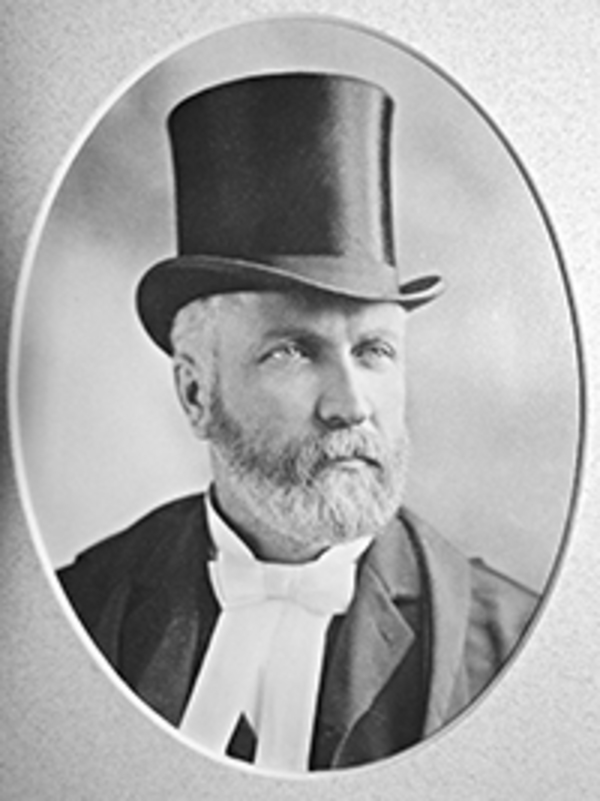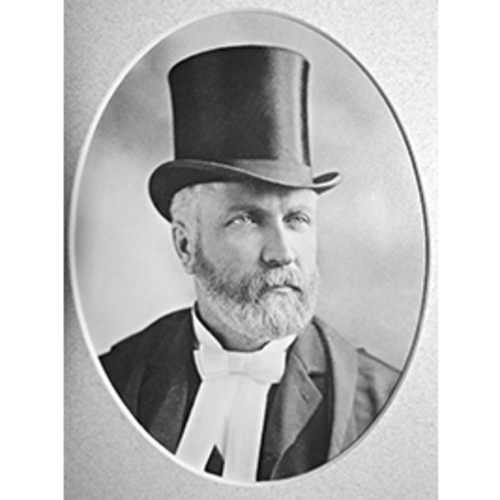
Source: Link
BURCHILL, JOHN PERCIVAL, lumberman, businessman, and politician; b. 6 Feb. 1855 on Beaubears Island, N.B., son of George Burchill* and Bridget Percival; m. 4 Jan. 1882 Eliza Bacon Wilkinson (d. 4 Jan. 1921) in Bushville, N.B., and they had two daughters and one son; d. 18 Dec. 1923 in Newcastle, N.B.
John Percival Burchill, or J. P. as he was known to all, was educated at the parish school and the Chatham grammar school as well as through the Maritime equivalent of the grand tour. For J. P. this was a two-year trip to visit relatives in New Brunswick, New England, and as far west as St Louis, Mo. When he returned home in 1873, he joined his father in the lumber business at Nelson (Nelson-Miramichi) and continued his practical education with small business ventures outside the family firm.
In 1875 his father purchased a sawmill, and J. P. gradually took over the management of the company’s outside operations. He and his younger brother, George, joined their father in 1881 as partners in the new firm of Geo. Burchill and Sons. George Jr began to assume the management of the inside operations. With timber leases on over 100 square miles of crown land and their own sawmill, they constituted a mid-sized lumbering firm in New Brunswick.
J. P. first ventured into politics in 1878 and was elected to the Northumberland County Council. He was selected warden in 1882, his last year on the council. In the provincial general election that year he was returned to the House of Assembly in the four-member riding of Northumberland. Although Burchill was a Liberal, the party system in New Brunswick had not yet stabilized and members were often referred to as government or anti-government forces. Many were called “loose fish”; they frequently crossed the floor in the assembly to achieve their political ends. Burchill was not one of them, but he was independent in his Liberal affiliation and the needs of the lumber trade commonly guided his decisions. Lumber was not only his business, it was also the economic base for the province.
In Fredericton, Burchill sat on the opposition side of the assembly. But the election had left the house almost evenly divided, and after an attempt to govern Premier Daniel Lionel Hanington resigned and Andrew George Blair* became premier in 1883. Burchill was now a member of the government and, being inexperienced, he supported Blair’s changes to the crown land regulations. These adjustments were contrary to the wishes and needs of the lumber industry. As a consequence, he was defeated in the election of 1886.
He did not have to wait long to try again; a by-election was needed in 1887, and during the campaign Burchill admitted in a letter published in the Daily Sun (Saint John) that he had been wrong in supporting the changes to the timber regulations. He won this election. The late 1880s were a period of an extended depression, and although he championed the cause of the lumbermen, both in public and directly to the premier, he was unable to bring about regulatory change. Because of the opposition in the assembly and the prolonged slump, it was obvious that control of the crown lands was going to be an issue in the election of 1890. Premier Blair called it for January, and was accused of disenfranchising a large portion of the population. The lumberers were in the woods for the winter and would not be able to vote. Although nominally Liberals, Burchill and the other members from Northumberland were elected in opposition to the government on the matter of the timber regulations.
The election left the assembly evenly split between the government and anti-government members, with seven or eight independents, including the four Northumberland members, holding the balance of power. The four struck a deal with the government to have the timber regulations changed. Blair thus had his majority. One of the four Northumberland members, Lemuel John Tweedie*, became the surveyor general, two reaped a public works reward, but Burchill was content with a reduction in stumpage fees. The press and the opposition were vicious in their condemnations. Burchill was re-elected in 1892, 1895, and 1899. In the assembly the animosity and name-calling following “the Northumberland deal” were soon forgotten, and in 1893 Burchill was unanimously chosen speaker, a position he held until 1899. He was defeated in the general election of 1903.
Following J. P.’s defeat, George Sr retired from the firm, leaving J. P. and George Jr as the active partners. George Jr died in 1906 and George Sr a year later, however, and J. P. was left to operate the business alone. He was not a candidate in March 1908, when the Liberals lost to the Conservatives under John Douglas Hazen*, but he came out of retirement to win a by-election in December 1908 and served as an mla until 1912. He did not stand in the election that year.
In 1913 the Conservative administration of James Kidd Flemming changed the crown land regulations to give the government the power to renew leases without going through the normal process of a public offering. With the premier’s knowledge, or so a subsequent royal commission would conclude, an employee of the Crown Lands Department then demanded money from the lumbermen and in return assured them that their leases would be renewed without public auction. The plan, which was intended to raise $100,000 for the Conservative party, largely worked; $71,665 was contributed, of which Burchill paid his share. But the scheme was exposed in 1914, Flemming resigned, and the government was defeated at the next election in 1917. Perhaps prompted to come out of retirement to fight the administration because of this and other scandals, Burchill was successful in that contest. He served one term on the government side under Premier Walter Edward Foster* but lost in 1920 and left politics.
It was not only in the political arena that Burchill contributed to the lumber industry. In the 1880s, after he had assumed control of the outside operations of the family business, the firm had begun improving the lot of the workers in their establishments. Their camps were among the best equipped in the New Brunswick woods and they were known as fair and benevolent employers. Burchill was also president of the North West Boom Company and a director of the South West Boom Company. These were cooperative ventures for the benefit of lumber operations of all sizes which drove their logs down the Miramichi every spring. The participants paid according to the number of logs they had in the drive. He became the first president of the Lumbermen and Limit Holders’ Association of New Brunswick when it was formed in 1913.
Burchill served as president of the Miramichi Steam Navigation Company for at least 15 years before its business was wound up in January 1920, and he was a founder of its successor, the Miramichi River Service Limited, the following June. He also sat on the Miramichi Pilotage Commission. A founding director of the Miramichi Agricultural Exhibition Association Limited, he was its president from 1915 to 1917. He belonged to the freemasons and served two terms as worshipful master of Northumberland Lodge No.17. He was also a past master of the Sons of Temperance. A vestryman of St Paul’s Anglican Church in Bushville, he was buried in the church cemetery.
PANB, MC 1156; MC 1246; RS68, 1906. J. G. Burchill, A Miramichi saga ([Miramichi?, 2000?]). CPG, 1880-1920. A. T. Doyle, Front benches & back rooms: a story of corruption, muckraking, raw partisanship and intrigue in New Brunswick (Toronto, 1976). Elections in New Brunswick, 1784-1984 (Fredericton, 1984). Burton Glendenning, “The Burchill lumbering firm, 1850-1906; an example of nineteenth century New Brunswick entrepreneurship” (ma thesis, Concordia Univ., Montreal, 1978). W. D. Hamilton, Dictionary of Miramichi biography; biographical sketches of men and women born before 1900 who played a part in public life on the Miramichi: Northumberland County, New Brunswick, Canada (Saint John, 1997). Diane Myles, Speakers of the Legislative Assembly, province of New Brunswick, 1786-1985 (Fredericton, 1986). Jane Percival Dollahan, The ancestors and descendants of John Percival of the Miramichi (Tucson, Ariz., 1972). Prominent people of New Brunswick . . . , comp. C. H. McLean ([Saint John], 1937). Prominent people of the Maritime provinces (Montreal, 1922).
Cite This Article
Burton Glendenning, “BURCHILL, JOHN PERCIVAL,” in Dictionary of Canadian Biography, vol. 15, University of Toronto/Université Laval, 2003–, accessed January 1, 2026, https://www.biographi.ca/en/bio/burchill_john_percival_15E.html.
The citation above shows the format for footnotes and endnotes according to the Chicago manual of style (16th edition). Information to be used in other citation formats:
| Permalink: | https://www.biographi.ca/en/bio/burchill_john_percival_15E.html |
| Author of Article: | Burton Glendenning |
| Title of Article: | BURCHILL, JOHN PERCIVAL |
| Publication Name: | Dictionary of Canadian Biography, vol. 15 |
| Publisher: | University of Toronto/Université Laval |
| Year of publication: | 2005 |
| Year of revision: | 2005 |
| Access Date: | January 1, 2026 |



